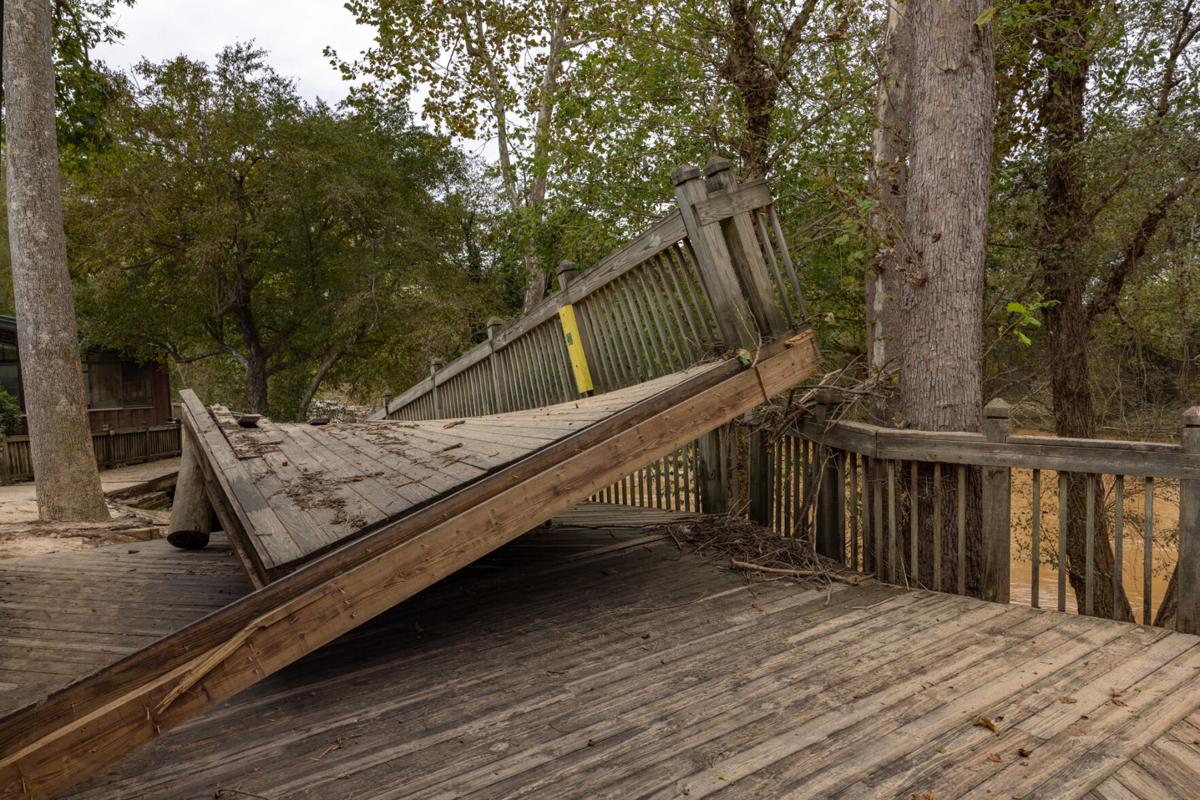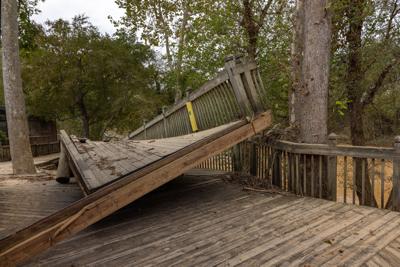The ¶®ÉḋṁÛ Greenway is another step closer to getting the boardwalk behind the River Village shopping center rebuilt.
The ¶®ÉḋṁÛ City Council got the ball rolling on the design process for a replacement Monday night, contracting with ¶®ÉḋṁÛ-based Areté Engineers for up to $120,730 for design, bid and construction oversight on the project.
The boardwalk was washed out when the area flooded during Hurricane Helene in September 2024. Floodwaters caused partial collapses and pushed some parts of the boardwalk to overlap. Council members approved a contract to remove the damaged boardwalk in February, said City Manager Sally Sandy.
Sandy said the engineering firm has a vested interest in doing the work there because its office is in the River Village shopping center.
âThey are some of the tenants planning to go back and be back there, so this is literally in their back door,â Sandy said.
People are also reading…
Aretéâs bid was the lowest responsive, responsible bid submitted to the city for the project.
The city plans to apply for a grant of up to $1 million to help pay for the boardwalkâs rebuild.
Sandy said the North Carolina Department of Commerce has opened a small business infrastructure program allowing local governments to apply for grants of up to $1 million for projects that would improve access to impacted small businesses who have 150 or fewer employees.
She said she thinks the boardwalk would be a perfect example because of the number of small businesses in River Village that would be impacted by its reopening, including the restaurant Town Tavern.
City officials estimate the cost of rebuilding the boardwalk will be somewhere in the $1.5-2 million range, Sandy said. She said the city hopes to get this grant, which does not require a local match, but will seek FEMA reimbursement for any costs for the boardwalk the grant may not cover.
Council gives thumbs down to proposed legislation
Several bills in the stateâs General Assembly were opposed by the council after a vote Monday night.
Wendy Smith, director of development and design for the city, said there are about 120 different bills in the NC legislature pertaining to building and zoning matters, but the three bills the council voted to oppose Monday night would have the most significant impact on the cityâs ability to do its job.
NC House Bill 765 would reform some development regulations in the state and eliminates elements of site designs the city can regulate, Smith said. Some of those elements include landscaping standards in some instances and how large driveways can be coming off the street. It would set statewide standards for medium density zones, requiring allowing up to four living units per acre in cities with populations smaller than 125,000 people.
âA big concern that we have about that is we donât have enough water and sewer capabilities to service four dwelling units per acre throughout the city, but this would say that we canât deny them,â Smith said. âThe intent of the bill is obviously to make housing cheaper for people, but if we canât get sewer there and youâve got to put in a $50,000 alternative septic system because youâre on such a small lot, youâre not really making housing cheaper for people.â
Council members would no longer get to review subdivisions, something they can now do only if the council needs to approve new city infrastructure. Instead, those would become administrative approvals, Smith said. The bill would limit staff members and other government officials, including council members, from voting on some matters.
Senate Bill 492 allows single exit stairways in multi-family residential buildings. Smith said fire officials are concerned this could be a safety issue for residents trying to escape a burning building.
âPeople need at least two different ways to get out of a building in case there is a fire,â said ¶®ÉḋṁÛ Mayor Ronnie Thompson. âYou never know where the fireâs going to start.â
Senate Bill 451 would reduce continuing education requirements for certain occupational and professional licensing boards, including building inspectors, engineers, landscape architects and general contractors.
âOur building inspectors are telling us we actually need more education every year to keep up with the advances and changes in technology, and weâre very concerned that general contractors might not have the ability to keep up with those as well, resulting in buildings that maybe are unsafe for our residents,â Smith said. Council members unanimously voted to oppose the bills.
âI think most people are for affordable housing, but itâs got to be a good plan, and this doesnât seem to be one,â said Councilman Chris Hawkins.
Other actions taken by the council Monday night included:
- Assuming an annual share of Salem Fire and Rescueâs debt proportionate to the amount of land the city annexed from the fire district at its April meeting. The city will be responsible for paying the department about $3,862 annually as required by law.
- A budget amendment to move $130,000 from the general fund to the Hurricane Helene project fund for continued hurricane recovery expenses.
- Establishing filing fees for this yearâs city council election. Two seats are up, currently occupied by Wendy Cato and Chris Hawkins. Anyone looking to run for office will pay a $25 filing fee.
- Permit fees for storm-damaged properties have been waived through Dec. 31. The city has not charged any permit fees related to storm damage since the hurricane, Sandy said.


















